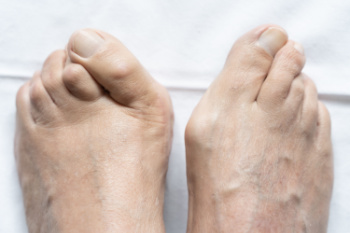NJ (908) 688-5577
NY (212) 737-2528

A bunion is a bony bump that forms at the base of the big toe when the joint becomes misaligned. This occurs when the big toe gradually shifts toward the other toes, causing the joint to stick out. Bunions develop due to factors such as genetics, wearing improper footwear, flat feet, or arthritis. Even after treatment, they can return if the underlying causes are not addressed. Wearing tight or narrow shoes continues to place pressure on the joint, leading to recurrence. Weak foot muscles or improper walking mechanics may also contribute to the problem. Maintaining proper footwear, using orthotics, and strengthening foot muscles can help prevent bunions from coming back. If discomfort persists, it is suggested that you consult a podiatrist who can correct the alignment and relieve symptoms.
If you are suffering from bunions, contact Glenn Davison, DPM of Advanced Podiatry. Our doctor can provide the care you need to keep you pain-free and on your feet.
What Is a Bunion?
A bunion is formed of swollen tissue or an enlargement of boney growth, usually located at the base joint of the toe that connects to the foot. The swelling occurs due to the bones in the big toe shifting inward, which impacts the other toes of the foot. This causes the area around the base of the big toe to become inflamed and painful.
Why Do Bunions Form?
Genetics – Susceptibility to bunions are often hereditary
Stress on the feet – Poorly fitted and uncomfortable footwear that places stress on feet, such as heels, can worsen existing bunions
How Are Bunions Diagnosed?
Doctors often perform two tests – blood tests and x-rays – when trying to diagnose bunions, especially in the early stages of development. Blood tests help determine if the foot pain is being caused by something else, such as arthritis, while x-rays provide a clear picture of your bone structure to your doctor.
How Are Bunions Treated?
If you have any questions, please feel free to contact our offices located in Union, NJ and New York . We offer the newest diagnostic and treatment technologies for all your foot care needs.